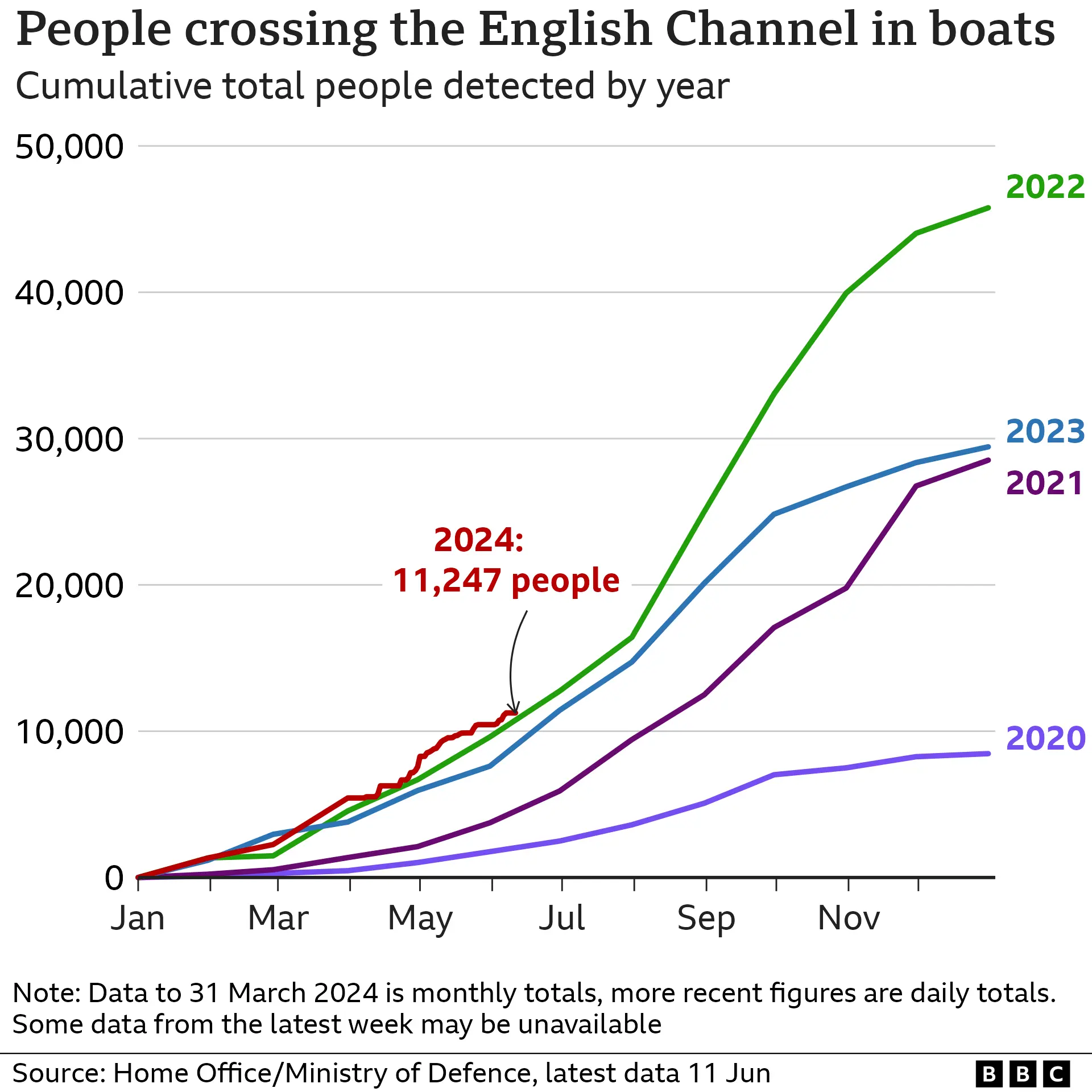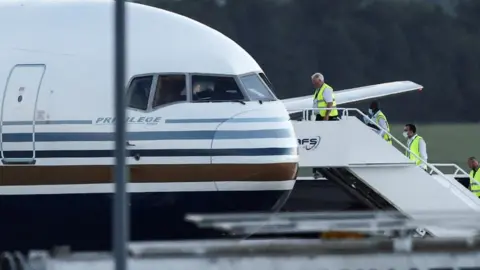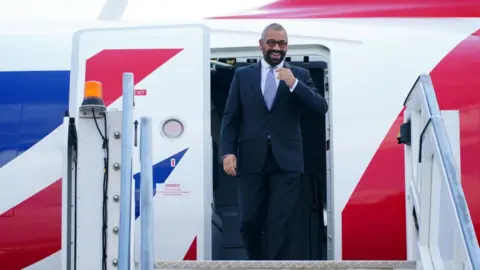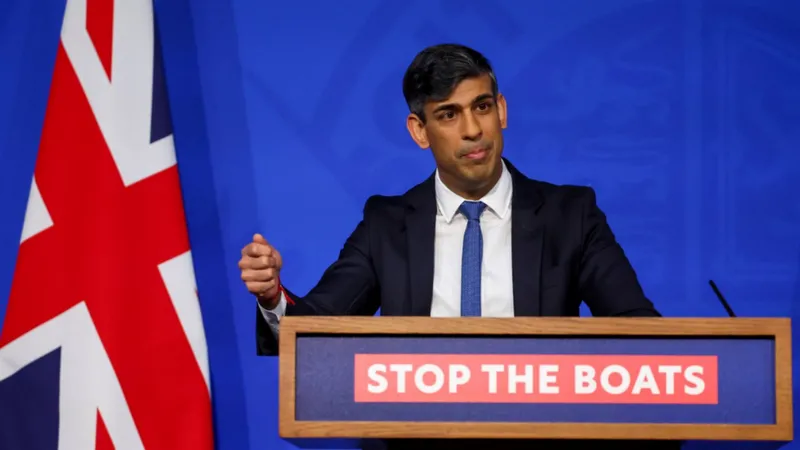UK’s plan to send asylum seekers to Rwanda?
Plans for the UK to send some asylum seekers to Rwanda were passed by Parliament, but are still facing legal challenges.
No flights will take place before the general election on 4 July.
What is the Rwanda asylum plan?
In April 2022, the government said that any asylum seeker entering the UK “illegally” after 1 January 2022, from a safe country such as France, could be sent to Rwanda.
They would have their asylum claims processed there, rather than in the UK.
If successful, they could be granted refugee status and allowed to stay in the landlocked east-central African country.
If not, they could apply to settle in Rwanda on other grounds, or seek asylum in another “safe third country”.
No asylum seeker would be able to apply to return to the UK.
The government says the plan will deter people from arriving in the UK on small boats across the English Channel, a key priority for Prime Minister Rishi Sunak.
As of 11 June, 11,247 people had crossed the Channel in 2024 – above the numbers for the same period in the previous four years.

Labour leader Sir Keir Starmer said he will scrap the Rwanda scheme if he wins the election.
The Liberal Democrats and the SNP also say the policy should be cancelled, because it breaks international law.
How many asylum seekers could be sent to Rwanda?
According to BBC home and legal correspondent Dominic Casciani, when the legislation was approved by Parliament on 22 April, there were 52,000 asylum seekers who could potentially be sent to Rwanda.
On 1 May, the Home Office released footage of immigration enforcement officers detaining several migrants at different addresses.
The move came after official documents revealed that the government had lost contact with 3,557 of the first 5,700 asylum seekers identified for removal.
A government source denied they were missing, and insisted the Home Office could contact everyone under consideration.
On 12 June, lawyers representing those who were detainedsaid that 79 of their clients had been released on bail.
Separately, in Maythe Home Office said the Rwanda scheme was being expanded to include those people who had already had an asylum claim refused or withdrawn and were unable to appeal.
That followed confirmation thatthe first failed asylum seeker had been sent to Rwanda under a voluntary removals programme which offers people whose claims are rejected up to £3,000 to move there.
When could the first flights leave?
Lawyers for the home secretary have confirmed that there will be no flights before at least 24 July – almost three weeks after the general election.
Speaking in pre-election interviews, Prime Minister Rishi Sunak said that if he is returned to power, there will be a regular rhythm of flights from later in July.
He had previously said the first flights would leave by the spring.
 Reuters
ReutersThe first flight was originally scheduled for June 2022, but was cancelled shortly before take-off because of legal challenges.
- Why a plane to Rwanda won’t be taking off anytime soon
What is the Rwanda bill and what legal challenges is it facing?
After the Supreme Court ruled that the scheme was unlawful, the government introduced a bill to make clear in UK law that Rwanda is a safe country.
The legislation – which was finally approved after intense political wrangling – orders the courts to ignore key sections of the Human Rights Act.
It also compels the courts to disregard other British laws or international rules – such as the international Refugee Convention – which would block deportations to Rwanda.
The UK government also signed a new migration treaty with Rwanda, which Home Secretary James Cleverly said guarantees that anyone sent there would not risk being returned to their home country.
The Rwanda Bill was fiercely criticised by opposition parties and by many charities representing asylum seekers.
After the bill passed, Illegal Migration Minister Michael Tomlinson said further legal challenges were expected.
Mr Sunak said that 25 courtrooms and 150 judges were available to deal with any legal cases, and there were “500 highly trained individuals ready to escort illegal migrants all the way to Rwanda”, with a further 300 awaiting training.
The FDA union, which represents senior civil servants, said it was launching a legal challenge because it feared officials implementing it could be forced to break the law.
The Asylum Aid charity also told the Home Office it intends to take the government to court over the plan because the rulebook for officials now implementing the scheme undermines a key safeguard for refugees.
Separately, Northern Ireland’s Hight Court ruled that large parts of the UK government’s Illegal Migration Act should not apply in Northern Ireland because they breach human-rights laws and the Windsor Framework – the post-Brexit deal agreed between the UK and European Union in 2023.
The ruling could undermine the government’s Rwanda plan.
Is Rwanda safe and what was the Supreme Court ruling?
In November 2023, the UK Supreme Court ruled unanimously that the Rwanda scheme was unlawful.
It said genuine refugees would be at risk of being returned to their home countries, where they could face harm.
This breaches the European Convention on Human Rights (ECHR), which prohibits torture and inhuman treatment. The UK is a signatory to the ECHR.
The ruling also cited concerns about Rwanda’s poor human rights record, and its past treatment of refugees.
Judges said that in 2021, the UK government had itself criticised Rwanda over “extrajudicial killings, deaths in custody, enforced disappearances and torture”.
They also highlighted a 2018 incident, when Rwandan police opened fire on protesting refugees, killing at least 11.
In June 2024, the United Nations’ refugee agency told the High Court thatit was investigating new allegations that Rwanda has endangered asylum seekers.
What will the Rwanda plan cost?
The UK government had paid £240m to Rwanda by the end of 2023.
However, the total payment will be at least £370m over five years, according to the National Audit Office.
If more than 300 people are sent to Rwanda, the UK would pay a one-off sum of £120m to help boost the country’s economy, with further payments of £20,000 per individual relocated.
On top of that, up to £150,000 will be paid for each person sent there, the NAO report said.
These figures would not include the cost of payments to anyone who chooses to go to Rwanda voluntarily.
 Getty Images
Getty ImagesPreviously released official figures suggested that removing each individual to a third country would cost £63,000 more than keeping them in the UK.
In December 2023, Mr Sunak claimed that the Rwanda plan would “literally save us billions in the long run”, but did not explain the figures.
The UK’s asylum system costs nearly £4bn a year, including about £8m a day on hotel accommodation.
Failure to process asylum claims efficiently “has led to unacceptable costs to the taxpayer”, a report by MPs said in October 2023.
Why is the UK Rwanda plan a problem for Ireland?
The Irish government said many asylum seekers were coming from Northern Ireland because they were “fearful” of being sent to Rwanda.
In May it said that about 6,000 people had crossed the land border in 2024.
The Irish government wants new powers so it can return these asylum seekers to the UK.
However, Mr Sunak told MPs that the UK would not take them.
“I can confirm that the United Kingdom has no legal obligation to accept returns of illegal migrants from Ireland,” he said.
LondonGBDESK//



Comments are closed.